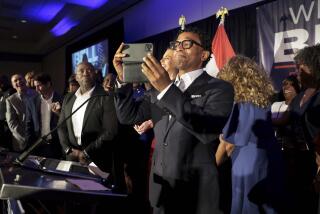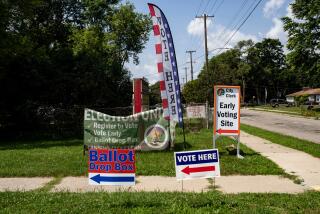Republican divide persists in Illinois
- Share via
Reporting from Effingham and Rosemont, Ill. — There’s something about Mitt Romney that, to use her words, creeps LaDonna Talbert out.
She doesn’t trust the Republican presidential hopeful and isn’t convinced by his jeans and open-collar shirts that Romney relates to the people of small-town and rural America. Her dismissive advice: “Just go back to the suit, dude.”
On Tuesday, Talbert plans to vote for Rick Santorum in the Illinois primary, even though she knows it will be tough for him to overtake Romney and wrestle the nomination away.
Some Republicans, believing the outcome is certain, want the race to end for fear all the mudslinging is undermining their chances of beating President Obama in November.
Not Talbert, 47, who teaches high school English in Wayne City, population 1,000 or so. “I like to see the democratic process take place,” she said. “Isn’t that what a democracy is? We keep voting and see how the people believe?”
Illinois, home to the nation’s third-biggest city and a celebrated past president — as well as the current one — has a history of closing out presidential nominating battles, having crowned half a dozen winners since 1976. Not this time, however. Regardless of who wins Tuesday — polls give Romney the edge — the Republican skirmishing will almost certainly go on, perhaps into June or beyond.
With its split between rural and metropolitan voters, a difference as stark as the contrast between a silo and Chicago skyscraper, Illinois helps illustrate why.
The city and its “collar county” suburbs are where most of the votes are cast. The tree-lined neighborhoods are filled with moderate Republicans like Linda Kottis, 59, a telecommunications company lawyer and Romney volunteer, who showed up for the candidate’s brief stop last week at a breakfast spot near O’Hare airport.
She admires the former Massachusetts governor for his “intelligence and good business experience” and believes Santorum — whose mere mention evoked a sigh — is too socially conservative to win in November, when the GOP nominee will have to appeal to independents and more-centrist voters.
“It’s all about electability at this point,” agreed David Mulvihill, 37, an attorney for Bank of America and another Romney supporter, who perched on a counter seat at Pancakes Eggcetera. “Defeating President Obama right now is the priority.”
Vince Ferraro is one of those who fears that will become harder if the race persists. Although he considers himself more conservative than Romney, Ferraro believes the time has come for Republicans to rally behind him.
“I don’t like to see them taking swipes at each other,” said Ferraro, 65, who works in commercial real estate and lives in Park Ridge, an affluent Chicago suburb. “Because the convention is at the end of August ... it doesn’t give us a lot of time to campaign against what we need to come campaign against.”
But 200 miles downstate, Marilyn Shoffstall spoke for many when she dismissed the national GOP front-runner as slick, slippery and, above all, suspect.
“I think Mitt Romney is a Democrat in Republican clothing,” she said, standing on her porch in Effingham, where she took advantage of her prime location, a corner lot on busy Route 40, to plant a Santorum sign on her front lawn. “He’s flip-flopped so many times I don’t really trust him.”
Shoffstall, 61, who runs a beauty shop in the back of her home, wants to beat Obama just as badly as the next die-hard Republican. But what is important now, she said, is to stand by her principles and not be swayed by talk of electability or that other argument the Romney side is making: inevitability.
“You might as well not vote at all if you’re not going to vote for who you want,” echoed Earl Peterson, 72, pausing between errands in Greenville, where a giant billboard declares on the way into town: “God Is Pro-Life.”
Peterson, a retired factory worker, is still shopping for a candidate but leans toward the former Pennsylvania senator. Neither Newt Gingrich nor Ron Paul can win, he said, and Romney “is just a little too shifty.”
That schism has emerged in state after state; not just between rural Republicans and those in cities and suburbs, but between voters who want different things from the eventual GOP nominee.
In the most closely decided states — Michigan and Ohio, which Romney carried, and Mississippi and Alabama, which Santorum won last week — the pattern has been the same: Romney prevailed among voters who said the ability to beat Obama was their chief priority. Santorum won among those who said it was most important to nominate a true conservative.
That goes a long way toward explaining why Romney, for all his advantages in money, organization and establishment support, has failed to cinch the nomination and why Illinois is not likely to wrap things up Tuesday.
Downstate — a misnomer, since it takes in everything outside the greater Chicago area, north and south — accounts for about 45% of the statewide vote. Much of it is closer — geographically, culturally and politically — to Memphis, Tenn., or Little Rock, Ark., than the Windy City.
Like the South, there is a strong religious influence, and many there view Romney’s Mormon faith with suspicion if not outright hostility. Lesley Stock, 60, has already decided to back Santorum. “I can’t get past the Mormon thing,” she said.
For all intents, most of those interviewed saw the Republican contest as a two-man race. Former House Speaker Gingrich still had several fans, among them Harold Thull, 71, a burly construction worker from Mulberry Grove.
“I like that Contract With America a lot,” Thull said of the campaign manifesto that helped sweep Gingrich and other congressional Republicans to power in 1994. But like others, Thull believed Gingrich had no chance of winning the nomination and suggested he ought to step aside to give Santorum a clear shot at Romney. (Gingrich has repeatedly said he plans to stay in the race.)
Texas Rep. Paul scarcely rated a mention, though his campaign signs poked up occasionally, especially around college campuses.
Like many, Joe Bonner isn’t particularly excited about any of the Republicans running. (To a person, all of the several dozen people interviewed said they would back whomever wins the nomination rather than support Obama.) Illinois may be hosting its first truly competitive GOP primary in over 20 years, but even that isn’t enough to stir Bonner, a 73-year-old retiree in Salem, in the south end of the state. Given the choices, he’ll probably skip voting Tuesday.
More to Read
Sign up for Essential California
The most important California stories and recommendations in your inbox every morning.
You may occasionally receive promotional content from the Los Angeles Times.














